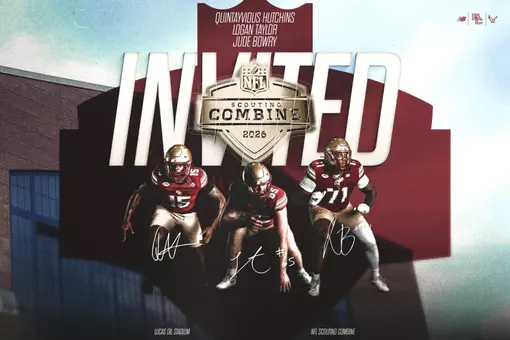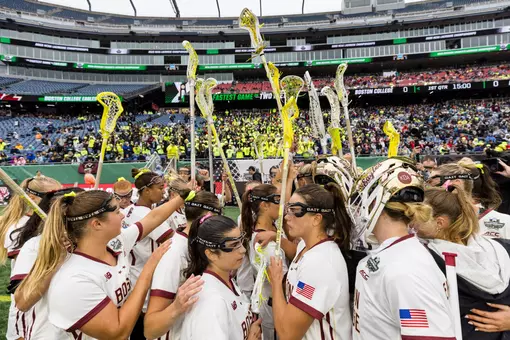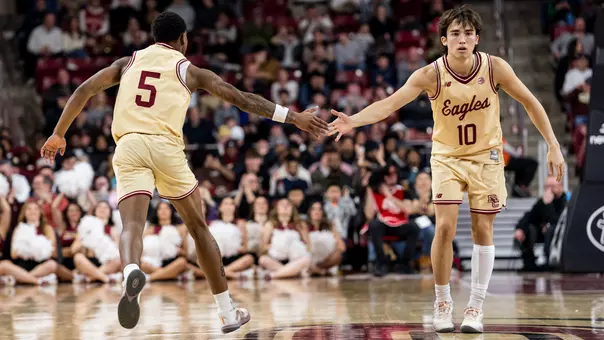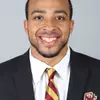Boston College Athletics
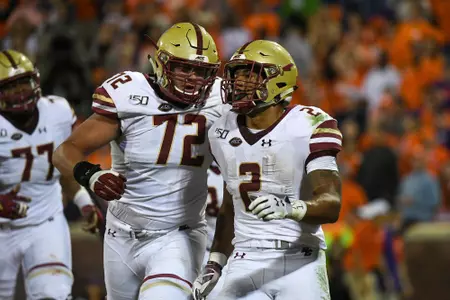
Appreciation For A Transcendant, Generational Talent
October 31, 2019 | Football, #ForBoston Files
AJ Dillon became the all-time rushing record holder last Saturday.
One glance at the Boston College football record book can provide anyone with a trip down memory lane. The names, etched in place forever, conjure images of legendary performances from years of wins and losses. The stories flow like a current that seemingly starts somewhere upstream, but never stops running to an unknown location.
It's especially true on the running backs pages where some of the biggest and brightest Eagles seamlessly create a legacy of greatness. It stretches from Fred Willis to Tom Bougus, through Mike Esposito and Keith Barnette, touching on Troy Stradford and Jim Bell. It explodes into the modern era with Chuckie Dukes and David Green before hitting a zenith with Mike Cloud, Omari Walker, William Green, Derrick Knight and Montel Harris.
Each era builds a foundation for the next generation, and the torch is continually passed to the next anointed superstar in the Boston College backfield before shattering a glass ceiling in the Steve Addazio era. After a once-in-a-lifetime season from Andre Williams produced BC's second Heisman Trophy finalist in 2013, the bar, thought to be unreachable any time in the near future, is now in the hands of AJ Dillon.
This past week, though the result of the Clemson game produced a defeat for the Eagles, Dillon broke the all-time rushing record set by Williams. His 10-yard carry in the third quarter pushed him two yards ahead of No. 44, giving him 3,741 career yards and establishing the junior as the ongoing standard bearer for the Boston College backfield.
"What a great, great honor for him," Addazio said once the dust settled from Saturday night. "(It's) well-deserved and hard work. He's done a fabulous job. I think he's having a heck of a year, just the way he's handling his business, the way his work ethic is and (his) preparation. It's a fantastic mark that he's set and will continue to grow on."
Because the Internet age is littered with social media, the modern era offers a unique look at Dillon's arrival and rise. High school athlete highlight reels are readily available through any number of websites, and college commitments are made-for-television events. It's easier than ever to follow and learn about players competing on the youth circuit, and it creates unprecedented hype for athletes matriculating into college.
It created an immense amount of hype around Dillon before he ever suited up for the Eagles. He famously decommitted from Michigan, electing to stay closer to his hometown of New London, Connecticut by choosing Boston College. It created a buzz at Alumni Stadium for his rookie season that could only be matched by a breakout performance for the ages.
It came halfway through the season when he asserted himself against Louisville. Dillon dueled with the Cardinals' Lamar Jackson, a Heisman Trophy winner en route to NFL stardom, and led the Eagles to a resounding, high-scoring win. It struck a chord for the rest of his rookie season, and he became the first Boston College player to win the ACC Rookie of the Year and ACC Offensive Rookie of the Year.
It created an immediate legend for Dillon, who finished with 1,589 yards. His performance was fourth-best in BC program history, 30 yards ahead of William Green's season-long effort in 2001. It gave him immediate pantheon status ahead of the former NFL first round pick, passing both Montel Harris and Derrick Knight along the way, and his 1,256 yards in the season's last seven games would have placed him ahead of Harris' entire 2010 total.
It made Dillon so widely respected and feared by opponents that people couldn't help but be disappointed by his sophomore season. An ankle injury limited him throughout the season, and he missed a couple of games en route to 1,108 yards and 10 scores. As it was, his yardage still placed him among the best in BC history, better than Green's 1994 season when BC went 7-4-1 and beat No. 11 Kansas State in the Aloha Bowl.
Both seasons combined to create the expectation that Dillon would eventually join the Mt. Rushmore of Boston College running backs, and he responded with three consecutive 150-yard games in the middle of the season. When he torched NC State for 223 yards and three scores, it became almost a foregone conclusion that he would pass Andre Williams. On Saturday, it finally happened, a moment that will live on and shine much brighter than the final score of the game it occurred in.
"I think it's great (to have AJ and Andre in the books)," Addazio said. "I think they're talented guys. It's a testament to the fact that we've been the No. 1 rushing team here in the conference and one of the top six rushing teams in America. I don't see us not continuing to be a very, very outstanding rushing team."
There exists a sublime difference between Dillon and the majority of his peers, though. Williams ran for 3,739 career yards and 28 touchdowns, but well over half of his production came during the 2013 season alone, a similar situation to Mike Cloud, who had 1,726 yards in 1998. Montel Harris and William Green scored consecutive 1,000-yard seasons, but that's still one less than Dillon. His dominance is so consistent that it's virtually impossible to touch, even if it's comparing apples-to-apples when talking about the most elite college backs in program history.
For Boston College, Dillon will always represent a crossroads. He grabbed the position and made it his own during a transformative 2017 season, and he rewrote what it meant to be a power back in the Addazio offense. He gave credibility to 240-pound backs by running through opponents with brute muscle, and it drew the attention of backs who are built like him. It's created a legacy unto itself, and it's on display every time the offense runs over a defense with Dillon or David Bailey.
"We've got David Bailey here," Addazio said. "We've got Patrick Garwo here. Patrick's an elite player. He understands that he came to a place where they not only want to run the football, (but) know how to run the football and will put its back in a very advantageous formation to do that. There's a reason why we've got some very, very talented players at that position, and hopefully we'll continue down that path."
Dillon's season - and his college career - isn't quite over, but each week brings a rare appreciation for him. Though his rushing record might not break any single season mark, he needs just 259 yards to become the first Boston College running back with 4,000 career yards. He needs one touchdown to break the career scoring record held by Keith Barnette, and he needs six scores to become the first ever Eagle with 40 rushing scores.
The marks are within reach, and before the season's over, it's possible he recreates a level that people marvel at as unbreakable. Each week is a new memory, a new level set by a player who began with expectations, somehow matched and exceeded them, then created a whole new level of excellence at a position of historical greatness.
It's especially true on the running backs pages where some of the biggest and brightest Eagles seamlessly create a legacy of greatness. It stretches from Fred Willis to Tom Bougus, through Mike Esposito and Keith Barnette, touching on Troy Stradford and Jim Bell. It explodes into the modern era with Chuckie Dukes and David Green before hitting a zenith with Mike Cloud, Omari Walker, William Green, Derrick Knight and Montel Harris.
Each era builds a foundation for the next generation, and the torch is continually passed to the next anointed superstar in the Boston College backfield before shattering a glass ceiling in the Steve Addazio era. After a once-in-a-lifetime season from Andre Williams produced BC's second Heisman Trophy finalist in 2013, the bar, thought to be unreachable any time in the near future, is now in the hands of AJ Dillon.
This past week, though the result of the Clemson game produced a defeat for the Eagles, Dillon broke the all-time rushing record set by Williams. His 10-yard carry in the third quarter pushed him two yards ahead of No. 44, giving him 3,741 career yards and establishing the junior as the ongoing standard bearer for the Boston College backfield.
"What a great, great honor for him," Addazio said once the dust settled from Saturday night. "(It's) well-deserved and hard work. He's done a fabulous job. I think he's having a heck of a year, just the way he's handling his business, the way his work ethic is and (his) preparation. It's a fantastic mark that he's set and will continue to grow on."
Because the Internet age is littered with social media, the modern era offers a unique look at Dillon's arrival and rise. High school athlete highlight reels are readily available through any number of websites, and college commitments are made-for-television events. It's easier than ever to follow and learn about players competing on the youth circuit, and it creates unprecedented hype for athletes matriculating into college.
It created an immense amount of hype around Dillon before he ever suited up for the Eagles. He famously decommitted from Michigan, electing to stay closer to his hometown of New London, Connecticut by choosing Boston College. It created a buzz at Alumni Stadium for his rookie season that could only be matched by a breakout performance for the ages.
It came halfway through the season when he asserted himself against Louisville. Dillon dueled with the Cardinals' Lamar Jackson, a Heisman Trophy winner en route to NFL stardom, and led the Eagles to a resounding, high-scoring win. It struck a chord for the rest of his rookie season, and he became the first Boston College player to win the ACC Rookie of the Year and ACC Offensive Rookie of the Year.
It created an immediate legend for Dillon, who finished with 1,589 yards. His performance was fourth-best in BC program history, 30 yards ahead of William Green's season-long effort in 2001. It gave him immediate pantheon status ahead of the former NFL first round pick, passing both Montel Harris and Derrick Knight along the way, and his 1,256 yards in the season's last seven games would have placed him ahead of Harris' entire 2010 total.
It made Dillon so widely respected and feared by opponents that people couldn't help but be disappointed by his sophomore season. An ankle injury limited him throughout the season, and he missed a couple of games en route to 1,108 yards and 10 scores. As it was, his yardage still placed him among the best in BC history, better than Green's 1994 season when BC went 7-4-1 and beat No. 11 Kansas State in the Aloha Bowl.
Both seasons combined to create the expectation that Dillon would eventually join the Mt. Rushmore of Boston College running backs, and he responded with three consecutive 150-yard games in the middle of the season. When he torched NC State for 223 yards and three scores, it became almost a foregone conclusion that he would pass Andre Williams. On Saturday, it finally happened, a moment that will live on and shine much brighter than the final score of the game it occurred in.
"I think it's great (to have AJ and Andre in the books)," Addazio said. "I think they're talented guys. It's a testament to the fact that we've been the No. 1 rushing team here in the conference and one of the top six rushing teams in America. I don't see us not continuing to be a very, very outstanding rushing team."
There exists a sublime difference between Dillon and the majority of his peers, though. Williams ran for 3,739 career yards and 28 touchdowns, but well over half of his production came during the 2013 season alone, a similar situation to Mike Cloud, who had 1,726 yards in 1998. Montel Harris and William Green scored consecutive 1,000-yard seasons, but that's still one less than Dillon. His dominance is so consistent that it's virtually impossible to touch, even if it's comparing apples-to-apples when talking about the most elite college backs in program history.
For Boston College, Dillon will always represent a crossroads. He grabbed the position and made it his own during a transformative 2017 season, and he rewrote what it meant to be a power back in the Addazio offense. He gave credibility to 240-pound backs by running through opponents with brute muscle, and it drew the attention of backs who are built like him. It's created a legacy unto itself, and it's on display every time the offense runs over a defense with Dillon or David Bailey.
"We've got David Bailey here," Addazio said. "We've got Patrick Garwo here. Patrick's an elite player. He understands that he came to a place where they not only want to run the football, (but) know how to run the football and will put its back in a very advantageous formation to do that. There's a reason why we've got some very, very talented players at that position, and hopefully we'll continue down that path."
Dillon's season - and his college career - isn't quite over, but each week brings a rare appreciation for him. Though his rushing record might not break any single season mark, he needs just 259 yards to become the first Boston College running back with 4,000 career yards. He needs one touchdown to break the career scoring record held by Keith Barnette, and he needs six scores to become the first ever Eagle with 40 rushing scores.
The marks are within reach, and before the season's over, it's possible he recreates a level that people marvel at as unbreakable. Each week is a new memory, a new level set by a player who began with expectations, somehow matched and exceeded them, then created a whole new level of excellence at a position of historical greatness.
Players Mentioned
Women's Basketball: Wake Forest Postgame Press Conference (Feb. 22, 2026)
Sunday, February 22
Men's Basketball: SMU Postgame Press Conference (Feb. 21, 2026)
Sunday, February 22
Men's Hockey: UConn Press Conference (Feb. 20, 2026)
Saturday, February 21
Women's Basketball: SMU Postgame Press Conference (Feb. 19, 2026)
Friday, February 20

